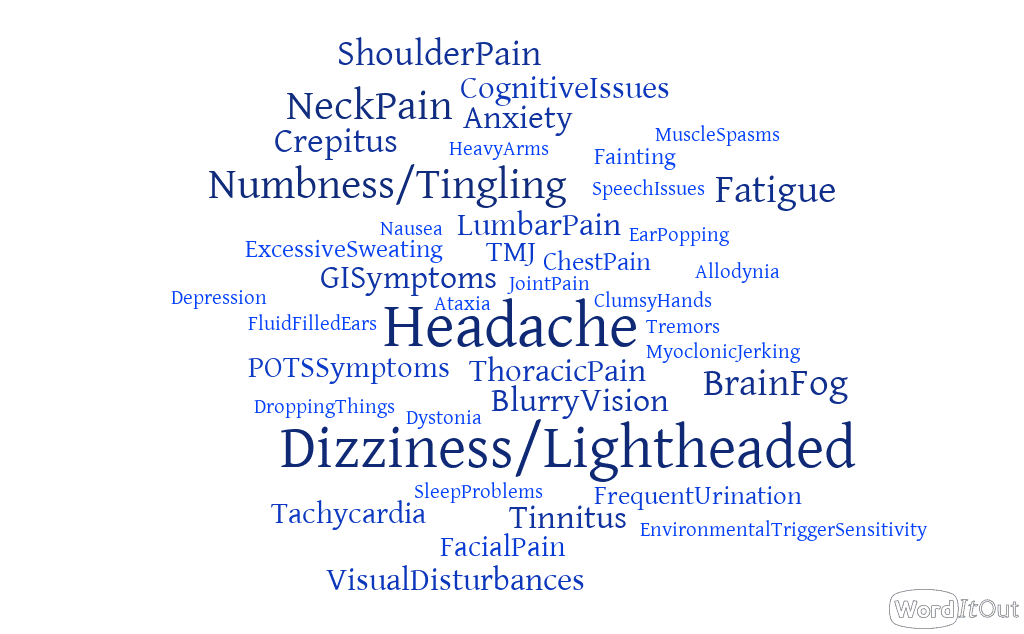What Are CCI Symptoms?

Craniocervical Instability (CCI) is a condition that hasn’t been studied with the same level of detail as many other more common medical diagnoses. Even symptoms are poorly researched. I’d like to change that and my contribution is now the results of the first formal survey of CCI symptoms. Let’s dig in.
What Is CCI?
CCI stands for Craniocervical Instability which means that the ligaments that hold the head on have been injured. While we have a bunch of low-level studies on surgical corrections like fusion, there is little published on the study of the problem itself. For example, we don’t even know what the symptoms should be outside of the opinion of individual physicians writing papers or textbooks.
To learn more about CCI, see my video below:
What Are the Symptoms of CCI?
The most basic understanding of any medical problem are its symptoms. What do patients with X problem commonly tell their doctor? After all, this guides huge amounts of medical spending on everything from diagnostic tests to treatments. Hence, confirming the symptoms of a medical condition is critical.
When I type “craniocervical instability symptoms” in the US National Libray of Medicine search tool (PubMed) I don’t get any hits that have examined what these are in any methodical way. Hence, I gave questionnaires to 80 confirmed CCI patients where I had asked them to list their symptoms and created the word cloud that you see above. The bigger the word, the more often it was reported by patients.
After 25 years of treating CCI patients, what on this list surprises me?
CCI Symptoms Expected and Surprises
The single most common symptom I have always seen in CCI patients is headaches so that one is expected. Dizziness/lightheadedness or imbalance is another, so again no surprise. Neck pain, numbness/tingling, brain fog, and fatigue are also no surprise. These are what I would describe as traditional CCI symptoms shared by almost all CCI patients.
Then we get into symptoms that are shared by most CCI patients. What surprises me here is that shoulder and thoracic pain was so common. I certainly see and treat shoulder and thoracic pain in many CCI patients, but I wouldn’t have guessed that these would show up in this second tier. Things I expected to see here were POTS symptoms, tachycardia, tinnitus, visual disturbances, crepitus, TMJ, cognitive issues, and GI problems.
Finally, we have symptoms shared by some CCI patients. This is a long and expected list of things like lumbar and facial pain, cerebellar symptoms like clumsiness/ataxia,/jerking, spasms, dropping things, fainting, chest pain, frequent urination, heavy arms, sweating, tremors, and sleep issues.
Nontraditional Symptoms
Every disease has patients who present with different symptoms than are common. Hence, it’s still possible to have CCI and have different symptoms than the most common ones shown here.
The upshot? We now have a report of common CCI symptoms that were collected and reported in a methodical way. That helps doctors identify what’s wrong and which tests to order. For patients, it helps them try to find which diagnostic box is right for them.

NOTE: This blog post provides general information to help the reader better understand regenerative medicine, musculoskeletal health, and related subjects. All content provided in this blog, website, or any linked materials, including text, graphics, images, patient profiles, outcomes, and information, are not intended and should not be considered or used as a substitute for medical advice, diagnosis, or treatment. Please always consult with a professional and certified healthcare provider to discuss if a treatment is right for you.
